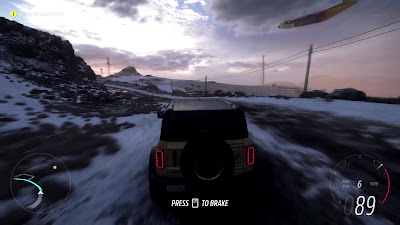Atlas Fallen Review: A New Direction for Deck13
Most interesting about Atlas Fallen is its confident pivot from the rest of the studio’s history. Instead of chasing the exacting precision of Souls-inspired design, it takes on a Shadow of Mordor or early Assassin's Creed flavor (like Assassin's Creed Odyssey, for example), melding a more sanguine form of exploration, light progression, and combat that rhythmically rewards timing, creativity, and experimentation, punishing it. The pacing is liberating. There’s time to breathe, admire the landscape, and get lost in side content without the omnipresent threat of failure.
That’s a choice that Atlas Fallen is intending to convey. Adventure is what the Atlas Fallen experience is meant to offer. As you cross enormous stretches of sand filled with the remnants of a long-lost civilization, you get the feeling of discovery, every step of the way, without it feeling contrived. The design philosophy seems to favor movement and inquisitiveness rather than repetition or difficulty. This is why the game is designed to foster exploration, not from a FOMO perspective, but from a sense of awe.
Atlas Fallen's Philosophy on Exploration and Design
Atlas Fallen manages not to overwhelm a player and remains one of its greatest strengths. Maps are large, but they will never be empty and will always contain a reward for rule observation and not checklist completion of a hidden cave, a crumbling shrine, or an abandoned structure. Scaleers seem to breathe the details of the world. The light hits the angle of each viewpoint, and the care for every single object that is placed by hand is so profound.
This meticulous style also applies to the progression systems. Engage with the world rather than grind menus to grab upgrades that are effortlessly interlaced with exploration and systems of customization to stick it. The philosophy of misinformation is older than the Assassin's Creed entries, which have to be focused, constructed, and value experience rather than try to optimize it.
Having three major open areas rather than one seamless map is an equally good decision for the variety of the game. Each new region is different to bear new invaluable content that soaks up the tones of around sun-drenched endless sights and the breathing relics of ancient holy cities. Segmentation also keeps the pacing fresh while having a world built on layers and layers of forgotten history.
You barely notice the beauty in the artwork in the game Atlas Fallen. It doesn’t wow you with spectacular, flashy visuals or immersion in the world. It uses elements of light and color shading. Warm shimmers of desert color hues appear. Gradations of light and shadow of sand pigments create a moving painting in the atmosphere. During the day, sunlight adds magic to the scene. It also marvels the eye with the level of realism portrayed in texture, both in the surroundings and in the atmosphere. The heat, dryness, and tiredness of the land are incredibly evocative.
The score complements this universe as if it were literally designed. It has a dreamlike, iridescent, and nearly weightless quality set to a backdrop of delicate chords with ambient sound and hints of gentle musical phrases that suggest benevolent isolation. The music somehow never calls for intention; it always seems to be present when needed, and adds to the moment without taking any focus away. The music works in atmosphere with the sound—a much stronger sound, the way the wind moves through empty rest, and far away sounds of little lassos across the sand—becomes a driving force of the almost consuming.
Storyline and Characters
Atlas Fallen sometimes drops the ball with pacing on the storyline. The rhythm of the game falters with some side quests that are sketched to have some level of narrative but lack depth and total conversations that, at times, feel off. Certain character movements feel a bit stiff, and a few traverse movements in smaller confined spaces need more polish. All of this serves as a reminder that this is a game of ambitions, sometimes stretching beyond the technical limits that are comfortable.
Regardless, none of the issues detracts from the game's most important achievement: Atlas Fallen is sincere. This is a world designed by the skilled craftsmen of Deck13 Interactive who understand texture and the tone of a space and how a place can emotionally engage a person. Even when the mechanics falter, there are many players who buy PS5 games who think that the heart behind them remains unwavering.
The Verdict: A Journey Through Beauty and Decay
With Atlas Fallen, Deck13 takes a confident step away from its past while demonstrating its creative development. The emotional stillness in her storytelling is accompanied by the splendorous landscapes and the artistry in her character movement. This is not a “Soulslike” game; it is something more gentle and reflective, a meditation on movement, memory, and the marvelling fragments that remain after time gives its eroding touch.
Craft over chaos is usually not sought after in a new open-world experience, so Deck13’s newest offering is a surprise. It does not broadcast its brilliance, but in its quiet times, under the endless horizon, Atlas Fallen communicates. I rate this a strong, heartfelt 9 out of 10. Here is my article on Atlas Fallen, written from the context of an open-world action-adventure design lover (with all the “Ubisoft formula” influences) while being critical of its shortcomings. No focus on violence; no gory descriptions.







Comments
Post a Comment